Key takeaways:
- Reparations politics requires acknowledgment of historical injustices and their ongoing impact on current societal inequalities.
- The conversation around reparations encompasses both financial compensation and broader systemic changes, emphasizing empowerment and community investment.
- Challenges such as political resistance, legal complexities, and emotional barriers hinder the progress of reparations advocacy and dialogue.
- The future of reparations movements is driven by grassroots activism, focusing on intergenerational justice and the need for a holistic approach to addressing social, cultural, and economic disparities.

Understanding reparations politics
Reparations politics is a multifaceted conversation that grapples with the historical injustices rooted in the legacy of slavery. I remember the first time I truly began to understand the weight of this dialogue; it was during a community meeting where individuals shared their family stories of hardship and resilience. Hearing these narratives sparked within me a deep realization—how can we expect healing and progress without acknowledging the past?
As I delved deeper into this topic, I often wondered: what does true justice look like for those affected by generations of systemic oppression? The debate over reparations brings forth varied perspectives, from financial compensation to educational opportunities. Each viewpoint is essential, but the underlying theme remains the same: it’s about recognizing a painful history and committing to a more equitable future.
Engaging with reparations politics also involves confronting our own biases and understanding how privilege plays a role in this discourse. Reflecting on my interactions with friends and colleagues, I noticed that many of them had never contemplated the implications of reparations. This realization prompted me to bring these conversations into our social circles, illustrating how powerful dialogue can be in bridging gaps of understanding and fostering empathy.
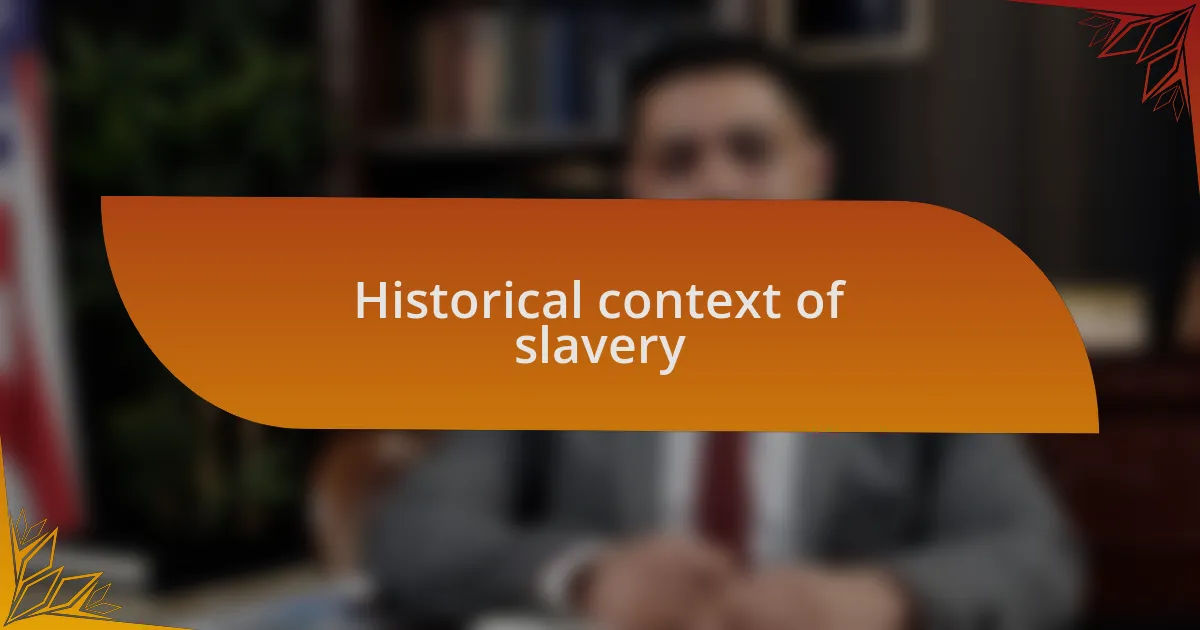
Historical context of slavery
Slavery’s roots extend deep into American history, shaping social hierarchies and economic structures long before the Civil War. I remember reading about the drafting of the Constitution and how it tacitly accepted slavery, leaving me with a sense of disbelief. It struck me: how could a nation founded on liberty and justice keep such a monstrous institution thriving?
The somber reality is that slavery was not merely an isolated chapter but a pervasive system that commodified human beings for profit. As I explored the horrors faced by those enslaved, I felt an overwhelming sense of grief and anger. It’s hard to fathom the generations of trauma and dehumanization, and I often ask myself, how do we reconcile this dark history with our collective identity?
Understanding the legacy of slavery also involves grasping how its repercussions shaped the socio-economic landscape we navigate today. I reflect on conversations with elders in my community who recount tales of resilience amid pervasive discrimination. These stories serve as powerful reminders that while slavery ended with the Emancipation Proclamation, its legacy continues to influence contemporary issues that demand our attention and action.
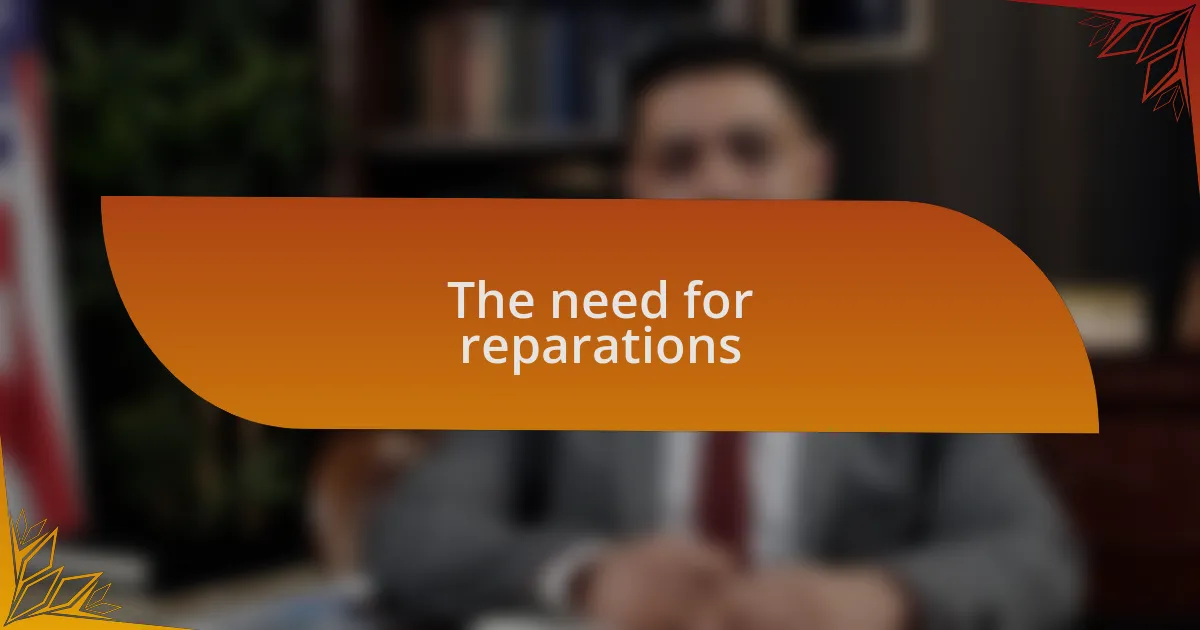
The need for reparations
Addressing the need for reparations is more than just acknowledging historical injustices; it’s about recognizing the enduring consequences of those injustices. I recall a conversation I had with a friend who, despite being knowledgeable about history, initially struggled with the idea of reparations. It took a heartfelt discussion about the wealth disparities that exist today—rooted in the injustices of slavery—for them to grasp why reparations aren’t just a financial issue but a moral imperative.
When I think about reparations, I often connect it to the stories I’ve heard from older generations in my family—tales of their struggles against systemic oppression, lack of access to education, and the insidious barriers that persist. It’s frustrating to see the ripple effects of these past injustices manifest in present-day inequalities. I wonder how many more lives could be transformed if we genuinely embraced the concept of reparations—not as a handout, but as a necessary step towards healing and justice.
In my view, the case for reparations isn’t solely based on historical guilt; it’s about accountability and recognizing the ongoing harm caused by the legacy of slavery. I have often asked myself: how can we claim to be a just society if we ignore the deeply rooted inequalities that originated from such a horrific past? The dialogue around reparations represents an opportunity for us to engage with our history honestly and work towards rectifying the imbalances that so many still face today.
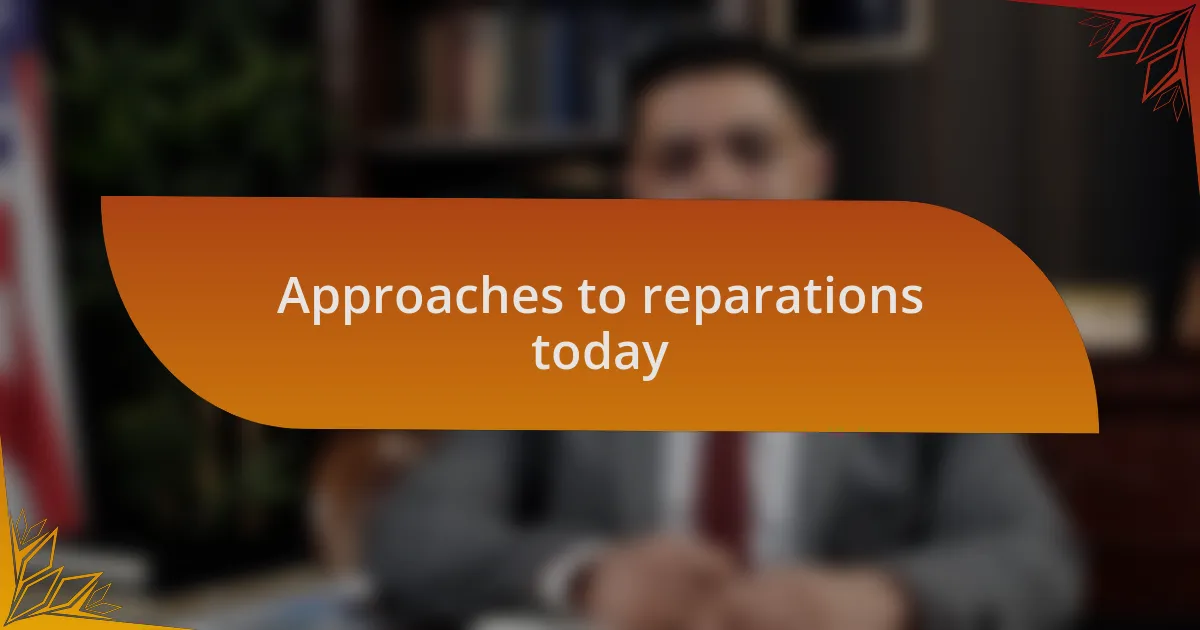
Approaches to reparations today
When I think about approaches to reparations today, it often feels like a balancing act between financial compensation and broader systemic change. For instance, some advocates emphasize monetary payments to descendants of enslaved individuals, arguing that this direct approach can help bridge the wealth gap. Personally, I have wrestled with the idea of how a simple check can serve as a remedy for such profound injustices, often leading me to consider the necessity for deeper investment in education and healthcare for marginalized communities.
Moreover, I’ve watched cities and states exploring various reparative measures beyond cash payments, from funding community programs to providing scholarships and resources for Black-owned businesses. It’s fascinating to witness these efforts evolve, reflecting the diverse opinions within the reparations debate. I remember discussing this with a local activist who passionately believed that reparations should focus on empowerment rather than just financial compensation—an idea that resonated deeply with me; it sparked questions about what true reparative justice means.
On a practical note, I have seen some proposals that suggest collective ownership of land and resources as a form of reparation. This concept raises so many questions in my mind about what land has historically meant to communities and how returning it can be a form of healing. For me, the challenge lies in finding solutions that genuinely address historical wrongs while also paving the way for a more equitable future—something we collectively can aspire to achieve.
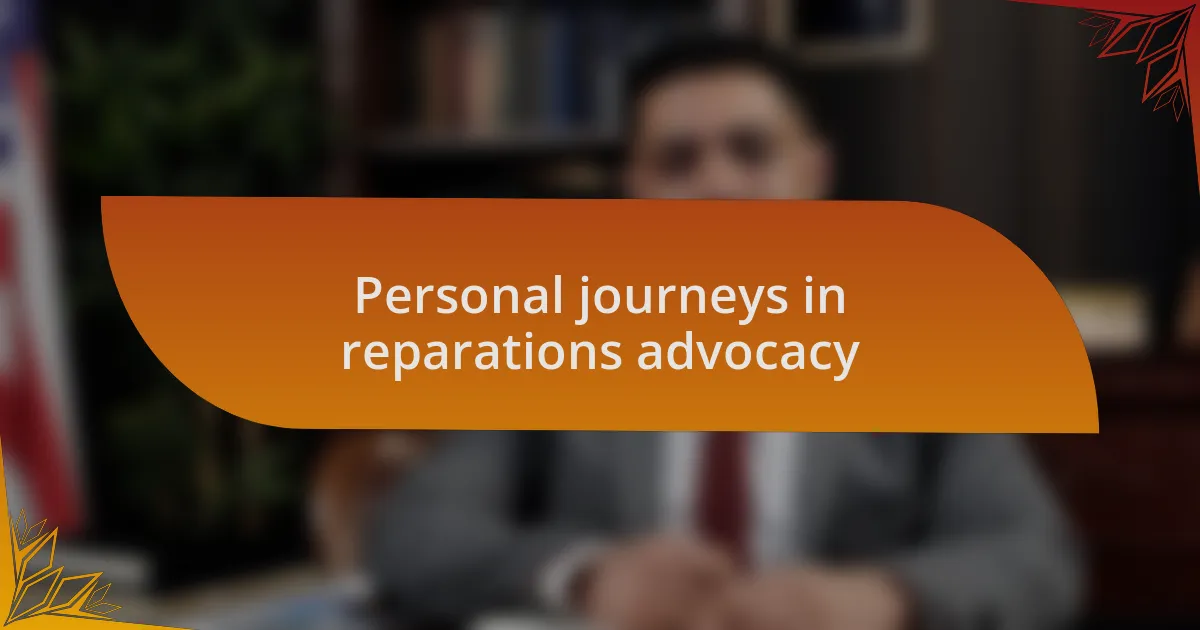
Personal journeys in reparations advocacy
Navigating the landscape of reparations advocacy has been a transformative journey for me. I vividly recall attending a community meeting where survivors of systemic oppression shared their stories. Their narratives were a powerful reminder of the lived experiences behind the statistics, deepening my understanding of why reparations matter not just as a concept, but as a pathway to healing and justice.
One of the most poignant moments came when I helped organize a panel discussion on reparations. Listening to speakers from different backgrounds, their stories intertwined with both pain and hope, I found myself reflecting on my own family history. It struck me how our personal narratives can illuminate the broader fight for justice. What can we learn from those in our communities who have carried these legacies? It’s a question I’ve pondered often since that day.
I also remember the moment I started volunteering with local activists pushing for policy changes. Witnessing their determination and commitment inspired me to immerse myself in the advocacy work. I often wonder how many more people might join this cause if they truly understood the implications of reparations on our society. It’s not just about financial compensation; it’s about acknowledging past wrongs and fostering a sense of ownership and responsibility for the future.
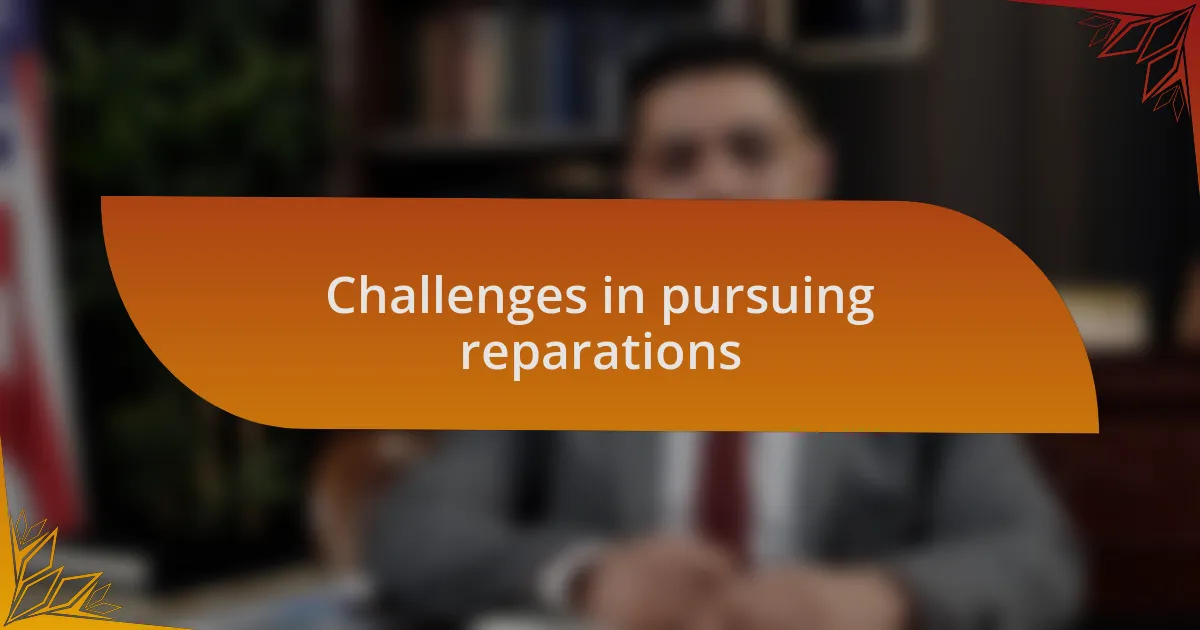
Challenges in pursuing reparations
It’s clear that one of the biggest hurdles in pursuing reparations is navigating the existing political landscape. Just recently, I attended a town hall meeting where various community members expressed their frustrations about governmental inaction. It got me thinking—why is it so difficult to mobilize political will when the moral imperative is so strong? The complexities of political alliances and differing agendas often overshadow the fundamental justice that reparations seek to achieve.
Moreover, the conversation around reparations is often tangled in legal and bureaucratic challenges. I recall a discussion with a legal expert who highlighted how the absence of a clear framework complicates efforts to claim reparations. It begs the question: how can we create meaningful change when the systems in place seem designed to delay action? The legal language can become a barrier, alienating those most affected who may not have the resources to navigate it.
Lastly, an emotional barrier exists within communities themselves. While sharing my own experiences of loss and pain with friends, I realized that not everyone is ready to confront the depths of these issues. Some people shy away from discussions surrounding reparations as if acknowledging them would make them personally responsible. This leads me to wonder: how do we encourage open dialogue that fosters healing rather than defensiveness? It’s essential that we create spaces for honest conversations, bridging the gap between acknowledgment and action in the reparations discourse.
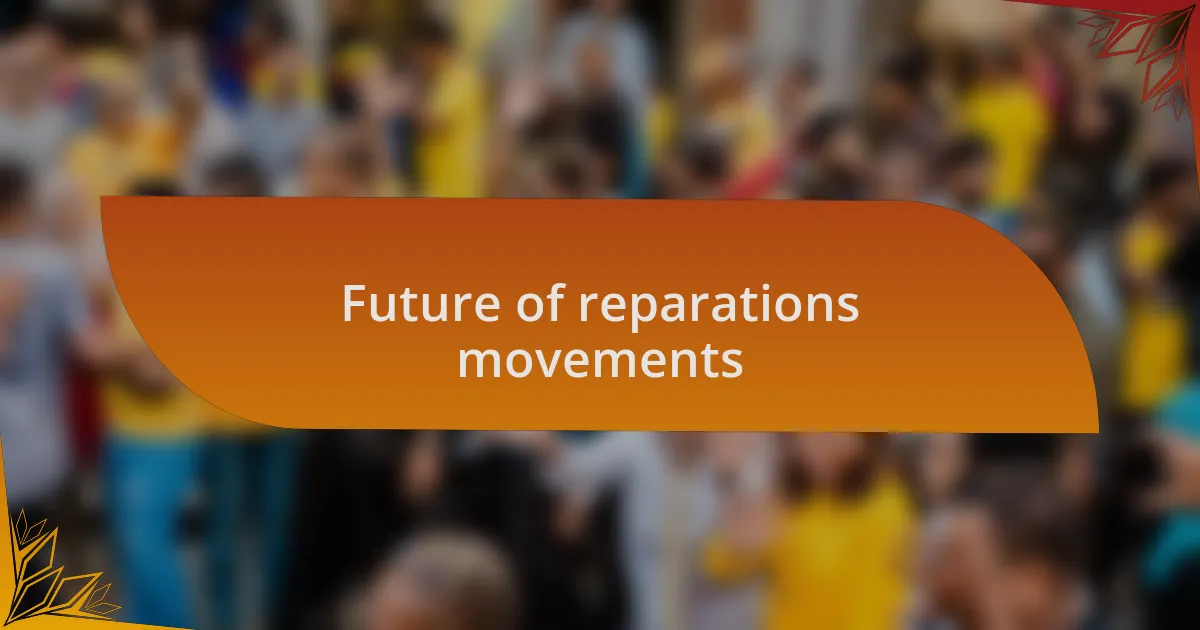
Future of reparations movements
As I look ahead to the future of reparations movements, I sense a growing momentum fueled by grassroots activism. I remember attending a rally where passionate speakers emphasized the importance of intergenerational justice. It struck me how this movement is not just about financial compensation; it’s a profound quest for dignity and acknowledgment of histories long overlooked. But I can’t help but wonder—what will it take for reparations to be universally recognized as necessary and not merely as a political talking point?
In my conversations with fellow activists, I’ve noticed a shift toward a more inclusive approach. People are beginning to realize that reparations must address not only economic disparities but also cultural and social injustices. I find it inspiring when community members share stories about reclaiming their narratives through education and art. This creative expression is vital; how can we separate the idea of reparations from the conversations that engage our hearts and minds? It’s about healing collective wounds, not just filling financial gaps.
Looking to the horizon, I am optimistic yet cautious. I recall a dialogue with a long-time advocate who pointed out that the path to reparations is fraught with pitfalls, often influenced by political tides. It underscores the question: will we have the political will to sustain these movements as they evolve? That’s where our responsibility lies—investing time and effort into building coalitions that can withstand these challenges. If we truly believe in reparative justice, we must be prepared for both the small victories and the larger battles ahead.